Approaching a young person whom you believe may be engaging in gambling can be sensitive, but it’s important to do so in a way that is non-judgmental, supportive, and understanding. Youth gambling can be an issue that stems from a variety of factors, including stress, peer pressure, or the influence of advertising, so it’s essential to have a constructive conversation that helps guide them toward healthier behaviors. Here are some techniques to consider when approaching youth about gambling:
a) Create a Safe and Open Environment
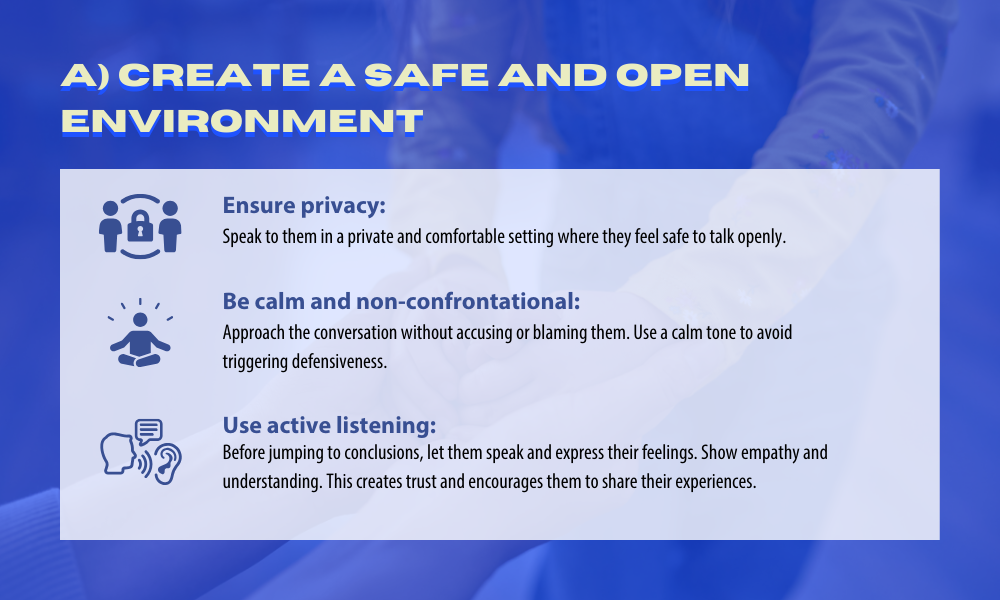
- Ensure privacy: Speak to them in a private and comfortable setting where they feel safe to talk openly.
- Be calm and non-confrontational: Approach the conversation without accusing or blaming them. Use a calm tone to avoid triggering defensiveness.
- Use active listening: Before jumping to conclusions, let them speak and express their feelings. Show empathy and understanding. This creates trust and encourages them to share their experiences.
b) Ask Open-Ended Questions
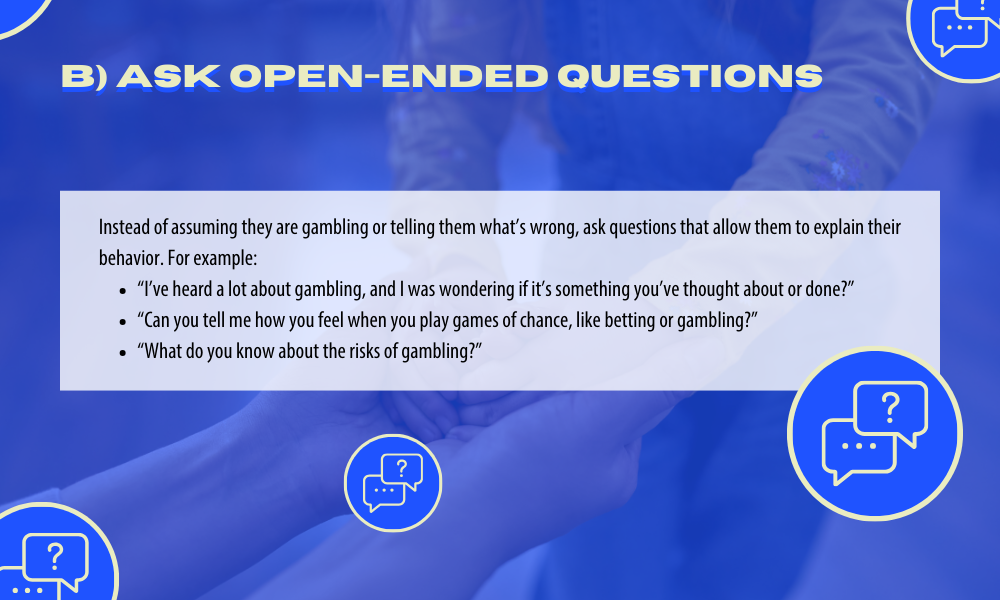
- Instead of assuming they are gambling or telling them what’s wrong, ask questions that allow them to explain their behavior. For example:
- “I’ve heard a lot about gambling, and I was wondering if it’s something you’ve thought about or done?”
- “Can you tell me how you feel when you play games of chance, like betting or gambling?”
- “What do you know about the risks of gambling?”
c) Educate About the Risks
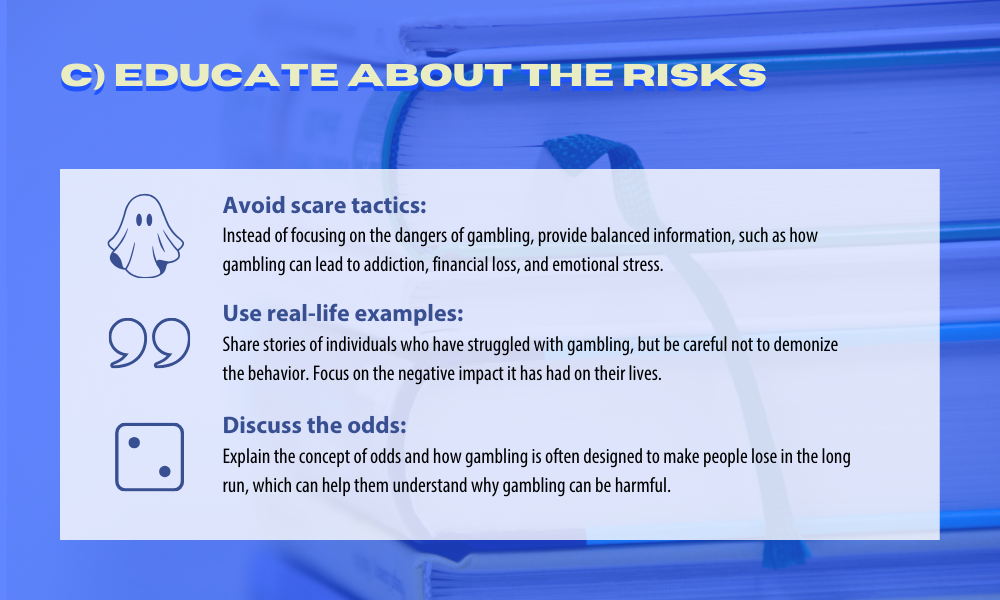
- Avoid scare tactics: Instead of focusing on the dangers of gambling, provide balanced information, such as how gambling can lead to addiction, financial loss, and emotional stress.
- Use real-life examples: Share stories of individuals who have struggled with gambling, but be careful not to demonize the behavior; focus on the negative impact it has had on their lives.
- Discuss the odds: Explain the concept of odds and how gambling is often designed to make people lose in the long run, which can help them understand why gambling can be harmful.
d) Discuss Their Motivations
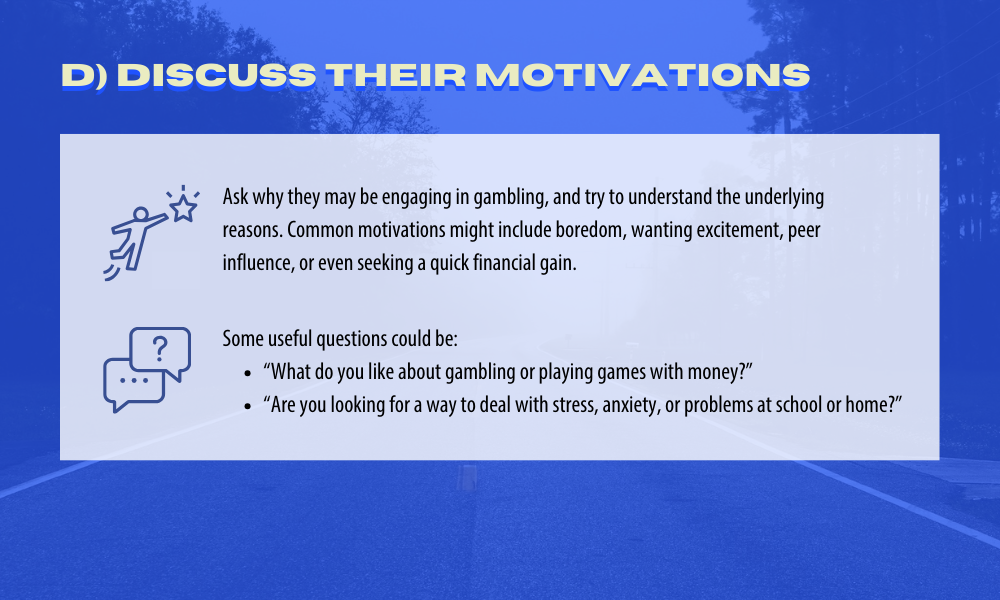
- Ask why they may be engaging in gambling, and try to understand the underlying reasons. Common motivations might include boredom, wanting excitement, peer influence, or even seeking a quick financial gain.
- Some useful questions could be:
- “What do you like about gambling or playing games with money?”
- “Are you looking for a way to deal with stress, anxiety, or problems at school or home?”
e) Focus on Healthy Alternatives
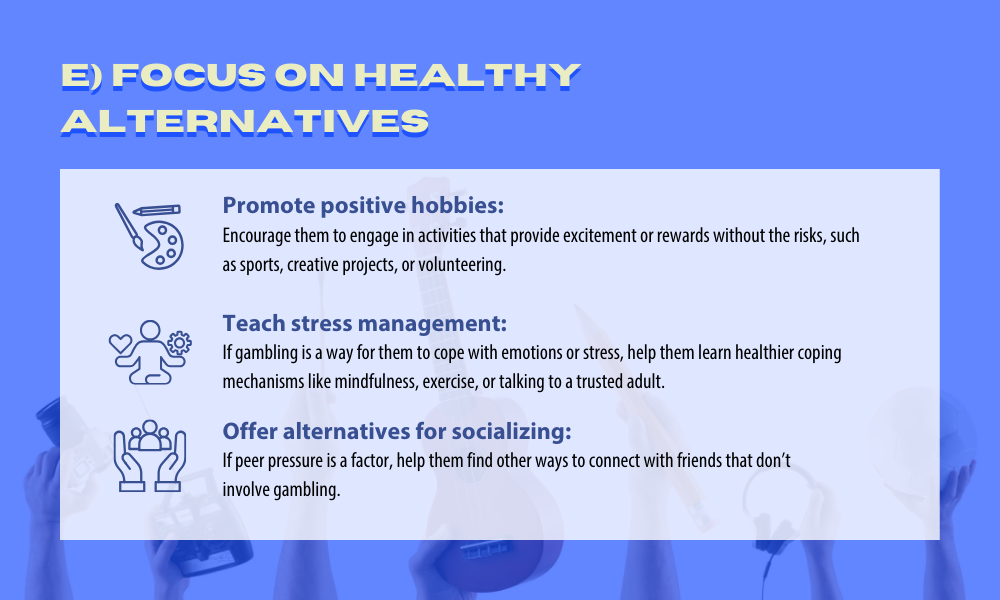
- Promote positive hobbies: Encourage them to engage in activities that provide excitement or rewards without the risks, such as sports, creative projects, or volunteering.
- Teach stress management: If gambling is a way for them to cope with emotions or stress, help them learn healthier coping mechanisms like mindfulness, exercise, or talking to a trusted adult.
- Offer alternatives for socializing: If peer pressure is a factor, help them find other ways to connect with friends that don’t involve gambling.
f) Set Clear Boundaries and Expectations
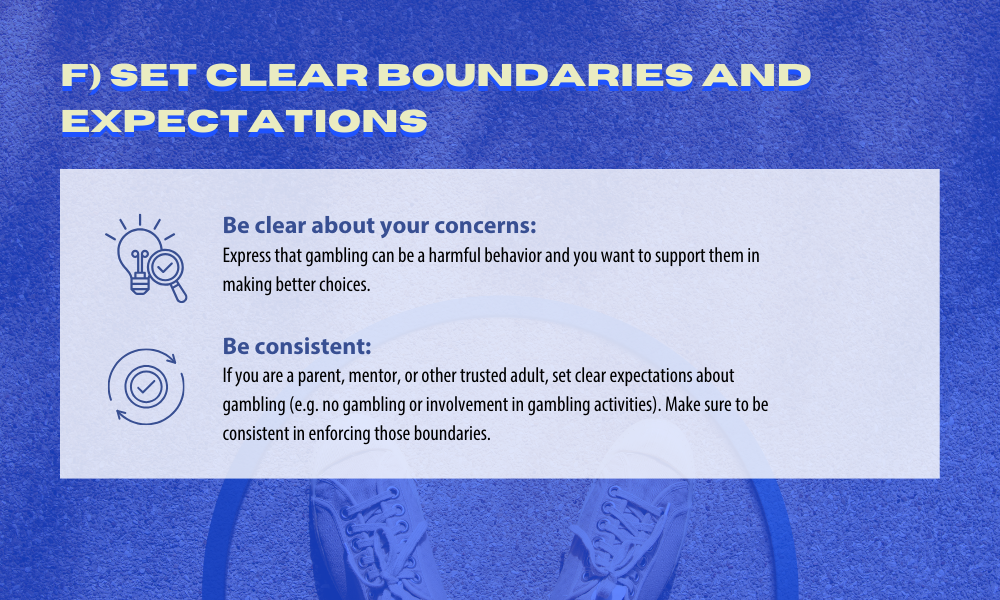
- Be clear about your concerns: Express that gambling can be a harmful behavior and you want to support them in making better choices.
- Be consistent: If you are a parent, mentor, or other trusted adult, set clear expectations about gambling (e.g., no gambling or involvement in gambling activities). Make sure to be consistent in enforcing those boundaries.
Set Clear boundaries:
- Don’t try to take control of the their life. It won’t work and will make you unhappy.
- Let the person causing harm through their gambling know you want to support them. They may feel out of control, embarrassed or ashamed.
- Support them in their struggle, but don’t take on their burden, especially not their debts. Choose to say, ”I can’t do this for you, but I will support you while you are doing it.”
- Allow them to take responsibility for their behaviour. Do not help them lie and deceive.
g) Promote Resources for Support
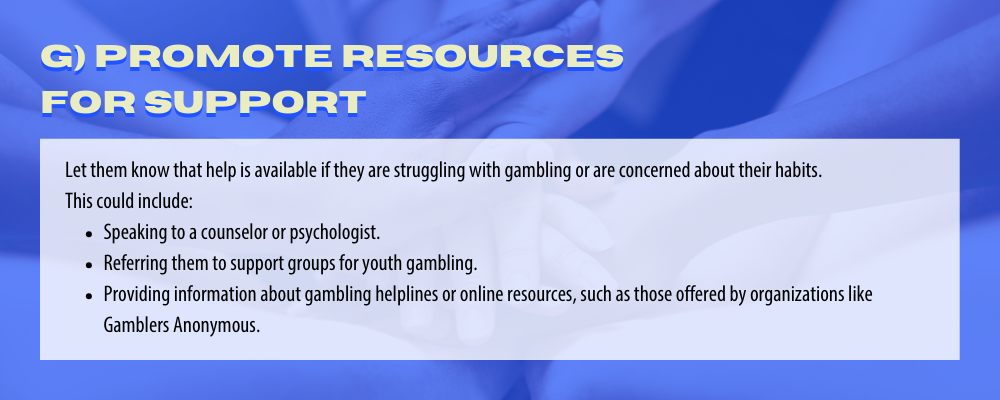
- Let them know that help is available if they are struggling with gambling or are concerned about their habits. This could include:
- Speaking to a counselor or psychologist.
- Referring them to support groups for youth gambling.
- Providing information about gambling helplines or online resources, such as those offered by organizations like Gamblers Anonymous.
h) Maintain an Ongoing Dialogue
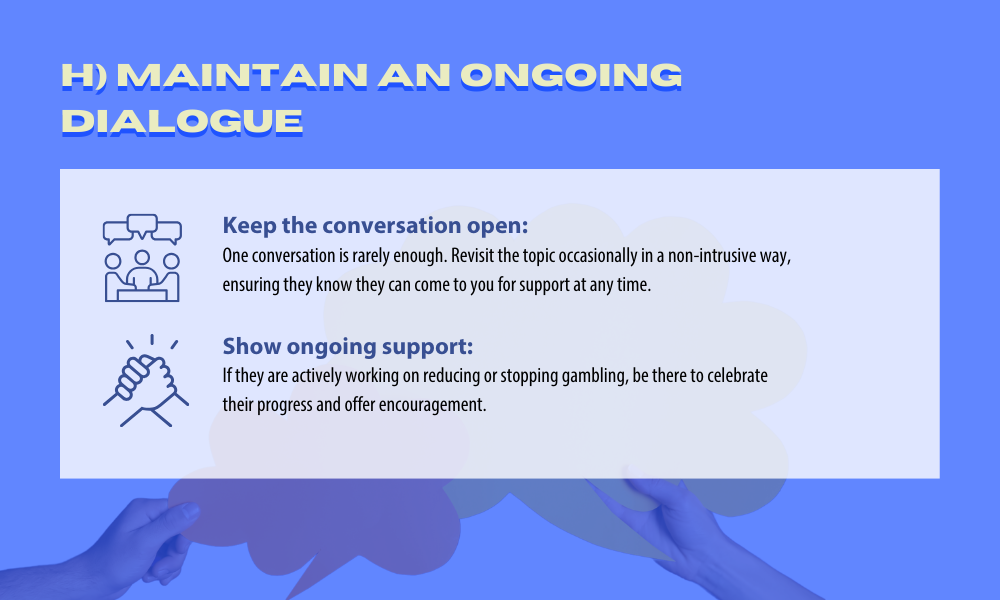
- Keep the conversation open: One conversation is rarely enough. Revisit the topic occasionally in a non-intrusive way, ensuring they know they can come to you for support at any time.
- Show ongoing support: If they are actively working on reducing or stopping gambling, be there to celebrate their progress and offer encouragement.
i) Involve Other Trusted Adults
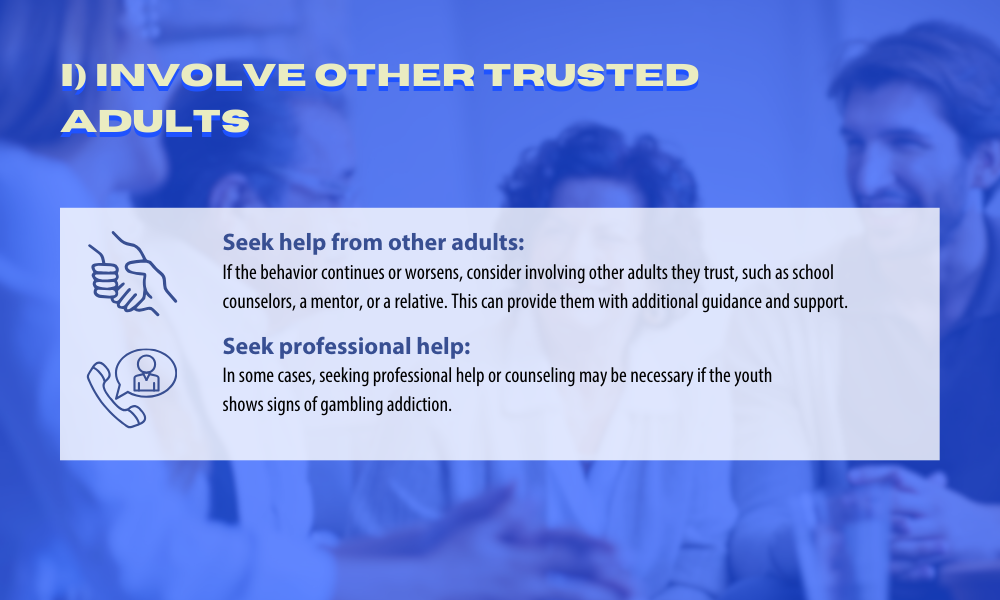
- If the behavior continues or worsens, consider involving other adults they trust, such as school counselors, a mentor, or a relative. This can provide them with additional guidance and support.
- In some cases, seeking professional help or counseling may be necessary if the youth shows signs of gambling addiction.
j) Model Healthy Behavior
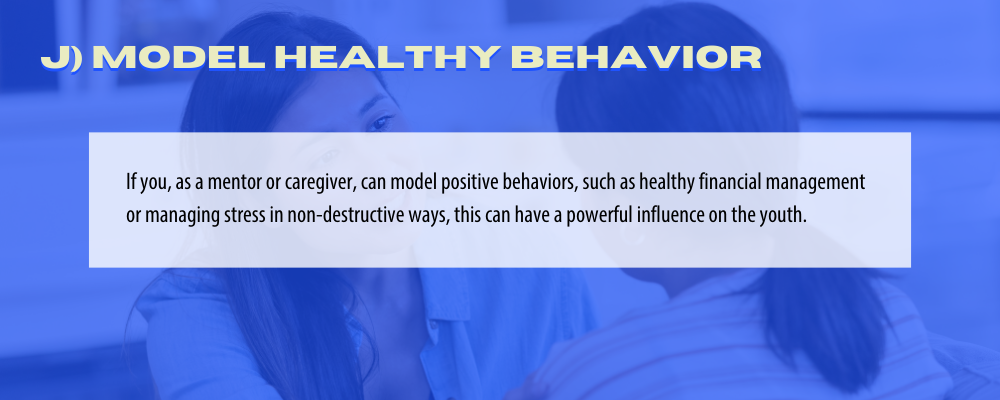
- If you, as a mentor or caregiver, can model positive behaviors, such as healthy financial management or managing stress in non-destructive ways, this can have a powerful influence on the youth.
Key Takeaways:
- Approach the situation with empathy and without judgment.
- Focus on understanding the reasons behind the behavior.
- Educate on the risks and consequences of gambling.
- Offer healthy alternatives and coping strategies.
- Encourage professional help if necessary.
By approaching the topic in a supportive and open-minded way, you can help a young person reflect on their actions and make more informed choices about gambling. However, coping with a family member or friend’s gambling behaviour can be challenging. It is important to remember:
- You cannot force your family member or friend to acknowledge that their gambling is harmful.
- You cannot force them to stop or control their gambling.
- No matter what you say or do, ultimately the only person who can take control is the person that gambles. It is important to understand that it is not the person causing harm but their behaviour.
- You are not to blame for their behaviour.